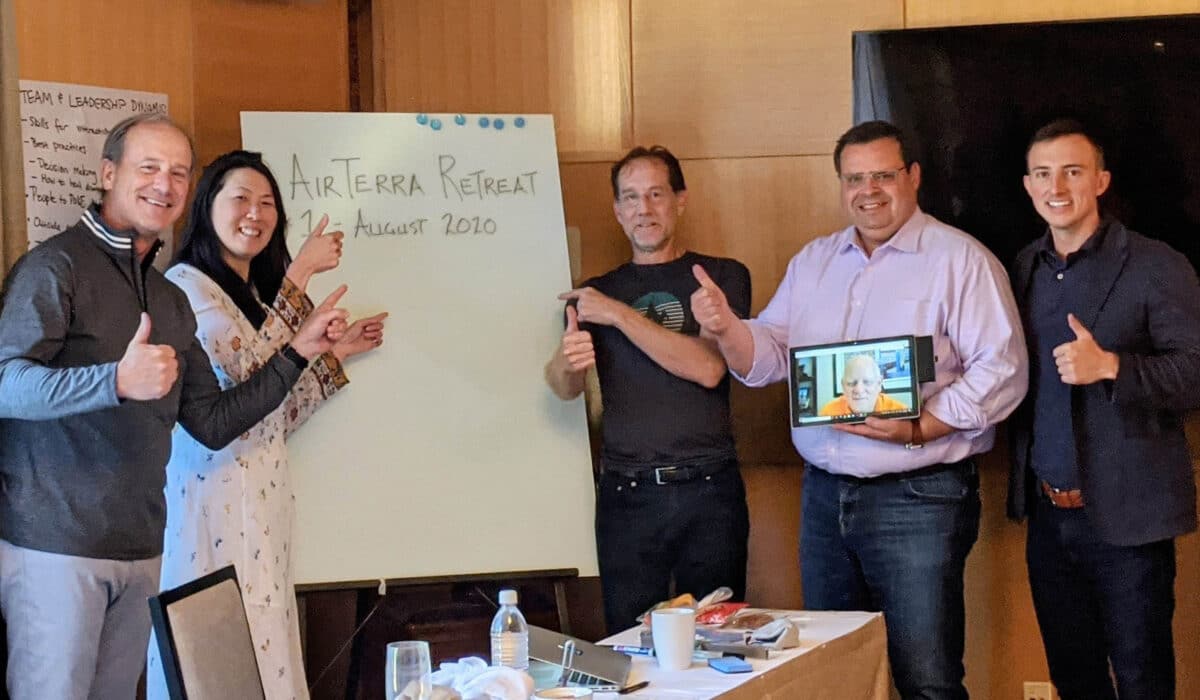“You couldn’t get more cliched than this,” Charlie Lieu said. “Brent and I had lunch, and we sketched [AirTerra] out on a napkin.”
Lieu and Brent Beabout had both worked at Amazon, and both graduated from MIT’s Leaders for Global Operations program, a dual-degree program where graduates earn both an MBA and an engineering degree. Nearly 15 years later, in 2020, Lieu reached out to Beabout to try to recruit him to serve as the COO for a startup she was advising. “When we had lunch to catch up, he said, ‘Honestly, I want to talk to you about starting my own company,” Lieu said.
Beabout had worked in logistics at Walmart and Nordstrom, according to FreightWaves. Lieu had started more than half a dozen companies and advised many more. They both had deep expertise in logistics. Together, they had the experience and network to turn an idea on a napkin into a company.
The idea was that AirTerra would combine shipments from multiple companies, allowing small and midsize e-commerce companies that couldn’t fill a whole truck on their own to share costs, shipping packages more cheaply. It also aimed to ship more quickly and reliably, according to RetailWire.
After working on the company for a few months, Lieu and Beabout brought four more colleagues on board, all of whom had experience in logistics: Jim Bowes, Erik Milici, Larry Arnstein, and Jim Kennedy.
Since the company was so new, Lieu said, they made all four co-founders, for a total of six co-founders. Each person chipped in some cash to buy shares of the company, between $500 to a few thousand dollars, Lieu said, while Beabout put in about $20,000. In total, she says, they bootstrapped the company with about $30,000 in startup costs.
American Eagle reaches out with an acquisition offer
After just 10 months, and before AirTerra had ever shipped a single package, American Eagle approached the group with a letter of intent (LOI) for an acquisition of the business. The company had tried to recruit Beabout a year or two earlier, Lieu said, and an inquiry about becoming a client turned into conversations about a sale.
At the time, the AirTerra team was starting to talk to venture capital firms about putting together a funding round of a few million dollars, Lieu said. “American Eagle didn’t just acquire, they brought tens of millions of dollars of capital to infuse into the company itself, to hypercharge the growth phase,” she said.
The team had previously agreed to go the VC route, even though they’d been approached by other potential acquirers. But American Eagle’s offer was simply too good to turn down. “The idea of going through multiple rounds of venture funding was not palatable to some of the people in the startup,” Lieu said. “It takes a very specific personality. You have to be very comfortable with risk. And you have to be very comfortable with having no income or very low income.”
The deal went through in May 2021. The buyer paid $3 million cash, according to its SEC filing (page 37), and the total acquisition package, including cash and stock, was in the low-8 figure range, Lieu said. She and Beabout handled most of the negotiations, she said, but because most of the team was staying on to run AirTerra under the American Eagle umbrella, individual co-founders negotiated their ongoing compensation themselves.
Lieu opted out of the acqui-hire. Her role at AirTerra had been to run corporate operations, and American Eagle already had those capabilities. “And I’m very much a startup person,” Lieu added. “I did not feel like I would be a good fit going into a large conglomerate.”
AirTerra is a stunning success story, literally going from simple sketch to acquisition in just 10 months. “We got lucky,” Lieu said. They had the right team at the right time, and they built the business during the pandemic, when supply chains suddenly became a huge pain point for retailers. The bottom line? “We had a good idea, and we had a team that had the right connections in an industry where relationships drive pretty much everything,” she said.
Now Lieu is working to pass that luck on to other women in the startup world. She’s a venture partner at the Sybilla Masters Fund, a women-led VC fund that aims to level the playing field for women-led startups. Only about 2% of VC funding goes to women. And yet women-led companies tend to outperform others, especially in economic downturns, Lieu said. “Women tend to start companies,” she said, “that are better for the world.”
